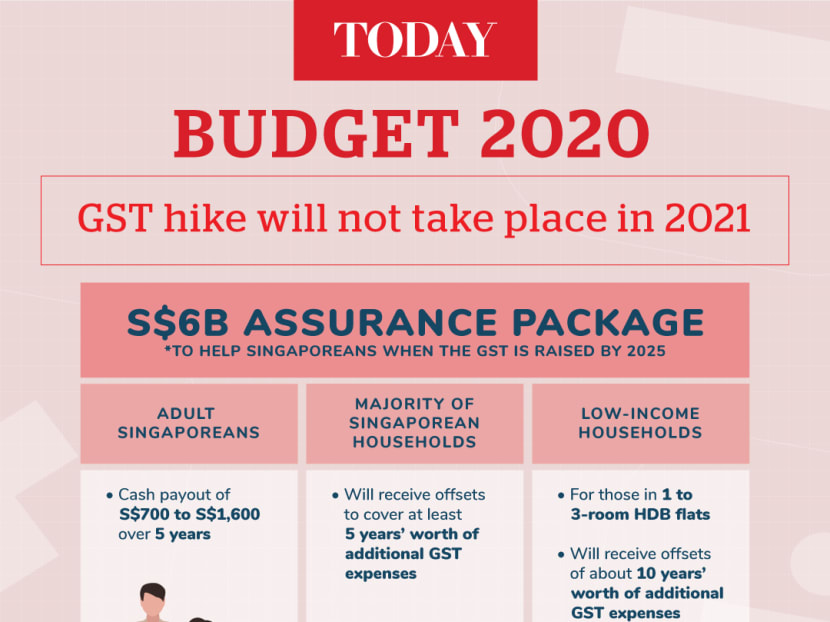Budget 2020: GST hike will not take effect in 2021, but will still be raised by 2025
SINGAPORE — Given Singapore’s weaker economic conditions and further impact from the Covid-19 virus outbreak, the planned hike in the Goods and Services Tax (GST) from 7 to 9 per cent will not take effect in 2021, said Deputy Prime Minister Heng Swee Keat in his Budget speech on Tuesday (Feb 18).

Mr Heng first announced the intended GST hike from 7 to 9 per cent in Budget 2018, and said then that the increase will take place some time between 2021 and 2025.
SINGAPORE — Given Singapore’s weaker economic conditions and further impact from the Covid-19 virus outbreak, the planned hike in the Goods and Services Tax (GST) from 7 to 9 per cent will not take effect in 2021, said Deputy Prime Minister Heng Swee Keat in his Budget speech on Tuesday (Feb 18).
“In other words, the GST rate will remain at 7 per cent in 2021,” said Mr Heng, who is also Finance Minister.
However, he added that the Government will not be able to postpone the increase indefinitely and that a hike “will still be needed by 2025”.
To help Singaporeans when the GST is raised by 2025, Mr Heng unveiled a S$6 billion offset package on Tuesday.
Mr Heng first announced the intended GST hike from 7 to 9 per cent in Budget 2018, and said then that the increase will take place some time between 2021 and 2025.
The purpose of raising the GST was to raise Government’s revenue due to an expected increase in recurrent spending, especially in healthcare, as Singapore grapples with an ageing population.
Reiterating this point on Tuesday, he said: “In fact, this (Covid-19) outbreak has reinforced the importance of continued investment in our healthcare system, including the capability to deal with outbreaks.
“And we will still require recurrent sources of revenue to fund our recurrent spending needs in the medium term.”
He added that the decision to not raise the GST in 2021 comes after the Government reviewed its revenue and expenditure projections and considered the current state of the economy.
“We will assess carefully the appropriate time for the increase. But rest assured we will provide Singaporeans sufficient lead time.”
Singapore’s economy grew 0.7 per cent in 2019, the slowest growth since the 2008 global financial crisis, as businesses experienced a slowdown in demand due to trade tensions between the United States and China.
The Covid-19 disease outbreak is expected to further batter the economy, with the Ministry of Trade and Industry downgrading its growth forecast for 2020 to between -0.5 per cent and 1.5 per cent, signalling that a possible recession is on the cards.
A S$6 BILLION ASSURANCE PACKAGE
On Tuesday, Mr Heng announced that the Government will provide a S$6 billion package to help Singaporeans when the GST is raised by 2025.
Called the Assurance Package, every adult Singaporean will receive a cash payout of between S$700 and S$1,600 over five years, depending on factors such as the type of public housing flat they live in.
This does not include offsets in the form of non-cash payouts, which has not yet been finalised.
In an example that Mr Heng brought up, a family of four with a combined income of S$6,000 living in a four-room Housing and Development Board (HDB) flat can receive a total of about S$7,000 in offsets over five years, of which about S$4,000 will be in cash.
Under this package, Mr Heng said the majority of Singaporean households will receive offsets to cover at least five years’ worth of additional expenses incurred due to the higher GST.
Lower-income households, specifically those living in one- to three-room HDB flats, will receive offsets equivalent to about 10 years’ worth of additional GST expenses incurred.
Mr Heng also said that the permanent GST Voucher scheme will be enhanced when the hike kicks in.

The GST vouchers aim to:
Fully offset the GST for retiree households living in one- to three-room HDB flats
“Significantly” offset the GST for retiree households living in four- to five-room HDB flats
Offset about half of the GST for lower-income households with no elderly persons
“This is the Government’s way of ensuring our system of taxes and transfers remains progressive and supports Singaporeans through the change, while enabling us to fund our future needs in a sustainable way,” said Mr Heng.
The Government will also continue to absorb GST on publicly-subsidised healthcare and education.
The S$6 billion Assurance Package will be set aside in the GST Voucher Fund in this year’s Budget.











